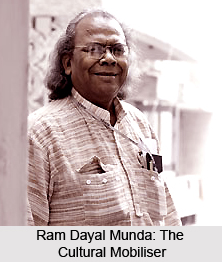Ram Dayal Munda was most distinguished and erudite Indian Adivasi, or aboriginal inhabitant, of modern times, a proud son of the indigenous Munda Tribe that for centuries dominated large tracts of central India and put up fierce resistance to British rule, Ram Dayal Munda never forgot where he came from: Indian Tribal Dance and music remained his first love, and no one who saw the way he and his tribal dance troupe took over Mumbai`s World Social Forum in 2004 with their flutes and drums is likely to forget it.
He was an Indian scholar and regional musical exponent whose contribution to Indian art and tribal progress is unmatched. Ram Dayal Munda was a vice-chancellor of Ranchi University and a member of the upper house of the Indian Parliament. In 2007, he was one amongst those were the proud recipients of Sangeet Natak Akademi Award.
Early Life of Ram Dayal Munda
Born in 1939 in the tribal village Diuri in Ranchi District of Jharkhand ( then Bihar), Ram Dayal Munda went through his primary schooling at the nearby Luther Mission School at Amlesa where he had the first glimpse of the outside world as foreign guests frequently visited his school. His secondary schooling at the sub divisional town of Khunti, 40 km away from home, further expanded his experiential horizon to other tribal and ethnic communities and their cultural activities.
Career of Ram Dayal Munda
Through these he came in close proximity to the state`s dignitaries like the Governors and Ministers. As the heartland of the historic Birsa Movement for autonomy in the British Empire, the Khunti area attracted scholars from all over the world, particularly from the discipline of anthropology. Ram Dayal Munda, along with his other friends, often acted as guide to the distinguished visitors this formed the basis for sprouting of his experiential world. Opting for anthropology as his subject for higher education with a focus on linguistics opened an altogether new world.
Ram Dayal Munda got an opportunity for getting higher education in Linguistics in an Interdisciplinary atmosphere, from an ambitious research project of the University of Chicago, on the Indic group (Santali, Mundari and others) of the Austro-Asiatic Languages under the directorship of Dr. Norman Zide. Dr. Munda obtained Ph.D from the University of Chicago and was subsequently appointed in the faculty of Department of South Asian Studies.
Later, Ram Dayal Munda was offered a position by the then Vice-Chancellor Dr. Kumar Suresh Singh to start a Department of Tribal and Regional Languages. The department became the rallying point for all social politico activists engaged in finding out ways to change the internal colonial situation the people of Jharkhand were faced with. A number of students, passed out from the department, formed a student body All Jharkhand Student`s Union (AJSU) pushing for formation of an intellectual base for the maintenance of the Jharkhand Movement already going at that time. This indirectly contributed to Ram Dayal Munda`s appointment as Vice Chancellor of Ranchi University in 1985. This led to him becoming a medium of political dialogue between the state and the movement of the people. As a result, the Committee on Jharkhand Matters was formed based on whose report the door to formation of the new state of Jharkhand was opened.
Ram Dayal Munda retired from active teaching in 1999 but his involvement with the cultural mobilization of the people continued which also included his active policy making at the UN Working Group on Indigenous People at Geneva and the UN Forum of Indigenous Issues in New York, in the capacity of a senior official of the ICITP, an all India tribal led and managed movement.
 Cultural mobilisation under Ram Dayal Munda
Cultural mobilisation under Ram Dayal Munda
In 1999, he retired from active teaching to concentrate on the cultural mobilisation of the Adivasis which included active policymaking at the U.N. His was a life dedicated to preserving Tribal culture. Ram Dayal Munda will be particularly remembered for building a troupe of dancers and musicians, whether as a student in India or in the United States, or later when he was teaching at Ranchi University: he consistently sought to integrate traditional performance culture into modern-day life. His troupe led the Indian cultural contingent in the Festival of India in the USSR in 1987; in 1989, it toured the Philippines, China, and Japan. Thanks to his leadership, village akharas for dance and music were revived across Jharkhand. Ram Dayal Munda is author of several books and consultant and participant in important issues of the adivasi people of the country. He has represented the country in the Festival of India in the USSR, and other cultural events in China, Japan and the South East, besides participating at the World Social Forum conferences in India. Ram Dayal Munda was honoured by the Sangeet Natak Akademi (for the year 2007) in recognition of his contributions.
Dr. Ram Dayal Munda of late had been the chief president of India Confederation of Indigenous and Tribal People (ICITP) is known as a cultural activist among the adivasi intellectuals of the country. He has been a member of various national and regional government as well as non-government organizations involved in development of the marginalized (adivasi, dalit, women) and other minority groups of the country. He is a regular participant in the UN Permanent Forum of Indigenous Issues, which relate him to the rest of the world having to do with the deprived communities of the world.
It is his lifelong dedication and contribution to the cause of preserving tribal culture that promises to live on. Musician, linguist, writer, scholar, educationist, institution-builder, tribal activist and a key figure in creation of Jharkhand - Ram Dayal Munda passed away in Ranchi on September 30 at the age of 72 whose personal slogan had been "Dance to survive!" His death has silenced a significant voice of emancipation in Indian contemporary times; humane obituary acknowledgement commemorates that voice.




















